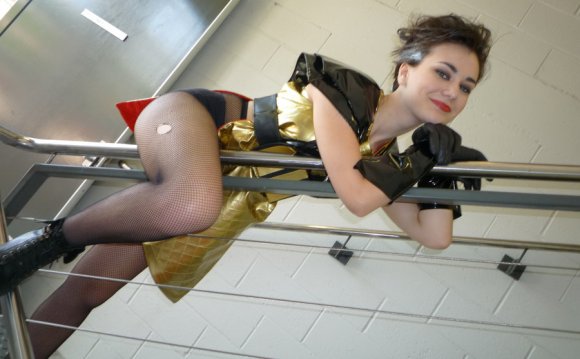
 As anyone who has attended a midnight showing of The Rocky Horror Picture Show can attest, it is not your normal movie-going experience. Audience members shout and throw things at the screen. People get out of their seats to dance the Time Warp. And members of "shadow casts" dress up as characters from the film and act out the entire thing as it's happening on the screen.
As anyone who has attended a midnight showing of The Rocky Horror Picture Show can attest, it is not your normal movie-going experience. Audience members shout and throw things at the screen. People get out of their seats to dance the Time Warp. And members of "shadow casts" dress up as characters from the film and act out the entire thing as it's happening on the screen.
These traditions are as weird and wonderful as the subversive, camp-horror musical film itself, which holds the record for the longest theatrical release in history. Fascinated by the enduring subculture that surrounds Rocky Horror, Portland-based photographer Lauren Everett has spent the last six years attending 20 midnight screenings in more than 10 different states, in theaters everywhere from Kansas City to New York to L.A. She documents the surreal, obsessive, and oddly touching world of the film's cult following in her new book, People Like Us, now raising funds on Indiegogo for its first print run.
Everett started the series while a student at Los Angeles City College, when she was given a photography class assignment to take the portraits of five people involved in a specific subculture. A good friend's roommate was playing Brad in a shadow production in Long Beach at the time and introduced her to other cast members, who in turn vouched for her to others across the country. Shooting mostly inside her subjects' homes, Everett uses hot lights with attached colored gels to capture the flashy, screen-accurate costumes and give the photos a distinctly cinematic feel.
Fans of the film will recognize characters acting out crucial points in the movie in the intimate setting of their home. An innocent-looking Janet—played by Susan Sarandon in the film—stands in her kitchen, shielding herself from the rain with a folded newspaper. Magenta, the seductive castle maid, is bathed in soft pink light in an ordinary living room. But even those who haven't seen the movie can appreciate the level of dedication that goes into making the intricate costumes, staffing and promoting the productions, and playing the same character month after month.
For many, Everett says, it's a way to lead a sort of double life—to escape the banality of the nine-to-five work day in favor of a more colorful world and accepting community. "It's a way for people to let off some steam and say whatever they want, do whatever they want, and be comfortable, and for a lot of people, that’s something that they really need, " she says in an interview. "[The shadow cast members] really try to create an inclusive environment."
YOU MIGHT ALSO LIKE












